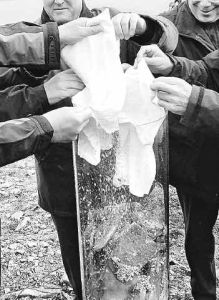 London: An ambitious project to safeguard future food supplies began on Monday with the launch of a ``Noah's ark'' for the world's most important plants. Above we see a vat being filled with seeds at the global seed bank in Longyearbyen, Norway, on Monday.
London: An ambitious project to safeguard future food supplies began on Monday with the launch of a ``Noah's ark'' for the world's most important plants. Above we see a vat being filled with seeds at the global seed bank in Longyearbyen, Norway, on Monday. The new Svalbard International Seed Vault will serve as a repository for crucial seeds in the event of a global catastrophe, said Norway's Agriculture Minister Terje Riis-Johansen. Carved into the permafrost and rock of the remote Svalbard peninsula, it will eventually house 3 million seed samples from every country in the world. This facility will provide a practical means to re-establish crops obliterated by major disasters,'' said Cary Fowler, executive secretary of the Global Crop Diversity Trust, which will manage the seed bank. ``But crop diversity is imperilled not just by a cataclysmic event, such as a nuclear war, but also by natural disasters, accidents, mismanagement, and short-sighted budget cuts.''
Agriculture relies on collections of crop species and their wild relatives. Seed banks are vital to the development of new crop varieties and, without them, agriculture would grind to a halt. Samples of the world's agricultural biodiversity, including crops such as wheat, apple and potato, are scattered across 1,400 seed banks around the world. All these seed banks are at risk from local problems. Mr. Fowler cited the example of the wars in Iraq and Afghanistan and the 1994 genocide in Rwanda as times when dozens of unique crops had been wiped out. The Norwegian government and the Global Crop Diversity Trust have worked on the idea of building a global seed bank of last resort in the Arctic ice since 2004.
On Monday, the Prime Ministers of Norway, Sweden, Denmark, Finland and Iceland launched the $4.8 million project at a ceremony near the town of Longyearbyen, in Norway's remote Svalbard Islands, roughly 990 km from the North Pole.
The new seed bank will store its samples in a reinforced concrete tunnel drilled 70 metres into a mountain, guarded by two steel doors and remote-controlled from Sweden. The seeds will be stored in foil packets at minus18C, and are expected to remain viable for thousands of years. If a crop is lost through natural disaster or war and a seed bank is destroyed, a government could request replacement seeds from the vault. The facility's remote location and permafrost will ensure that, even if the power fails, the temperature will never rise above freezing. The UN Food and Agriculture Organisation estimates that 75 per cent of the genetic diversity of agricultural crops has been lost. The U.S. had 7,100 varieties of apple in the 19th century, 6,800 no longer exist. The seed bank will start accepting samples in 2007. Norwegian Prime Minister Jens Stoltenberg said it would be of global importance. "It will be the only one of its kind. It is our final safety net." © Guardian Newspapers Limited 2006
No comments:
Post a Comment